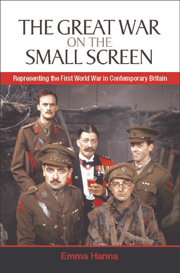Book contents
- Frontmatter
- Contents
- Acknowledgements
- List of abbreviations
- List of illustrations
- Introduction
- 1 An Unhealed Wound: Britain and the First World War
- 2 A Monumental Monument: The Great War (BBC, 1964)
- 3 Survivors: Veterans and the Nature of Personal Testimony
- 4 Heroes and Villains
- 5 Drama, Comedy and Drama Documentary
- 6 Over the Top: Reality Experiential Television
- 7 The Fear of Forgetting
- Filmography
- Bibliography
- Index
3 - Survivors: Veterans and the Nature of Personal Testimony
Published online by Cambridge University Press: 05 August 2013
- Frontmatter
- Contents
- Acknowledgements
- List of abbreviations
- List of illustrations
- Introduction
- 1 An Unhealed Wound: Britain and the First World War
- 2 A Monumental Monument: The Great War (BBC, 1964)
- 3 Survivors: Veterans and the Nature of Personal Testimony
- 4 Heroes and Villains
- 5 Drama, Comedy and Drama Documentary
- 6 Over the Top: Reality Experiential Television
- 7 The Fear of Forgetting
- Filmography
- Bibliography
- Index
Summary
The communication of memories has always formed an essential part of our historical record, but in Britain during the 1960s there was a marked increase in interest for the stories and experiences of the ordinary man. The fiftieth anniversaries of the First World War stimulated large-scale acts of public remembrance interfaced with growing interest in wider historical-social studies. In an increasingly post-literate age, veterans on television have returned oral history to its original folkloric and sociological roots where non-elite groups are permitted to share the main focus of recorded historical experiences.
The personal testimonies of veteran eyewitnesses have played a significant role in British televisual representations of both World Wars. In addition to documentaries about the First World War to be discussed here, eyewitness testimonies have been used to explore the personal stories of those who witnessed significant historical events. For example, a six-part series to commemorate the liberation of the largest Nazi death camp – Auschwitz: The Nazis and the ‘Final Solution’ (BBC, 2005) – was based on testimonies from more than 100 concentration camp survivors. Dunkirk: The Soldier's Story (BBC, 2004), also consisted of a composite of war narratives from interviews conducted with D-Day veterans for the making of the three-hour drama documentary Dunkirk (BBC, 2004). The Internet extended this realm of public history. During the VE Day celebrations in the spring of 2005, the BBC launched its ongoing ‘People's War’ project and actively appealed for anyone who remembers Britain at war 1939–45 to record their memories in an online archive.
- Type
- Chapter
- Information
- The Great War on the Small ScreenRepresenting the First World War in Contemporary Britain, pp. 63 - 88Publisher: Edinburgh University PressPrint publication year: 2009



